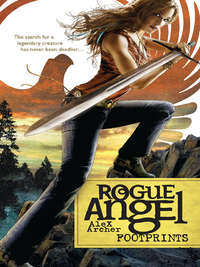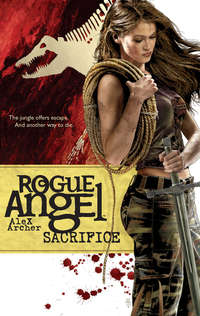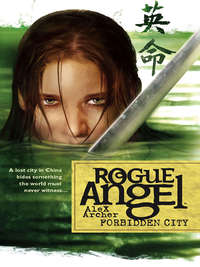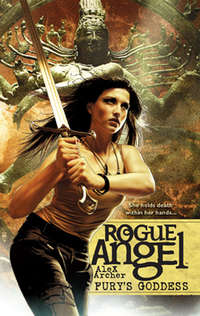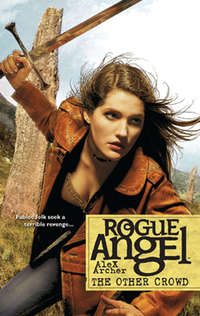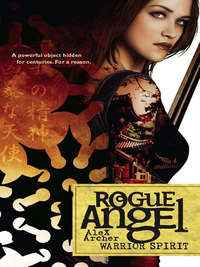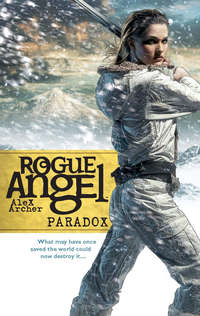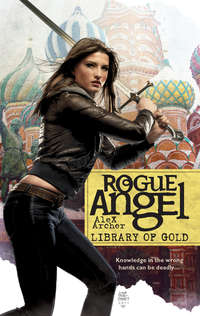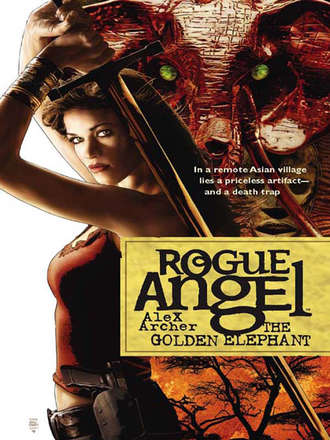
Полная версия
The Golden Elephant
Easy Ngwenya made up Annja’s mind for her by stopping to peer into an exhibit case a few yards ahead of her. I’m practically committed now, anyway, Annja told herself.
The younger woman studied an exquisite jade carving of an elephant in an elaborate headdress, standing with trunk raised to bedangled forehead. Annja felt a jolt. Could she be here for the same reason I am? she thought with something akin to panic.
She dismissed the idea. A collector who came to Annja, even anonymously, would know of her reputation for honesty and integrity, even if she was willing to operate under the radar. Somebody so discerning would hardly recruit a tomb robber as notorious as Ngwenya. Would they? Anyway, elephants weren’t exactly an uncommon motif in Asian art, and Ngwenya might be forgiven a special interest in them, given she was named for one. Also it wasn’t gold.
Annja came up on Easy’s left.
“Annja Creed,” the younger woman said without looking around. Annja realized Easy must have seen her approach in the glass. “What a delightful surprise to encounter you here.”
“A surprise, anyway,” Annja said through gritted teeth, “after the way you marooned me on that tomb mound in the middle of a rising lake.”
“Did the boat I sent back for you not reach you?” Ngwenya asked. “You must have had an unpleasant swim. Not my intention, I assure you.”
“The boat came,” Annja admitted grudgingly. “That’s not the point. I’m…placing you under citizen’s arrest.”
Ngwenya’s laugh was musical and entirely unconcerned. “Why, whatever for?”
She turned to look up at Annja. Annja was struck by just how young the international adventuress looked. She was in her twenties, having gotten an early start at a life of adventure. Or crime. She looked fifteen.
Annja was also struck by just how pretty Easy was. She had a big rounded forehead, a broad snubbed nose, full lips, a small round chin. That should have been less of a surprise—despite the currently unfashionable fullness of her figure, Ngwenya occasionally did modeling, not always fully dressed. The curves, Annja knew from the pictures she’d seen online, did not come from excess body fat.
“You have committed countless violations of international law regarding traffic in antiquities. As you well know,” Annja said.
The girl batted her eyes at her. Annja wished she wouldn’t. They were huge eyes, the color of dark chocolate, with long lashes. Annja suddenly suspected why she was named “elephant calf.” She had eyes like one.
“You’d already looted the seal from the feet of Mad Emperor Lu,” Ngwenya pointed out. “Congratulations on getting past the booby traps, by the way.”
“I had official permission, if you must know,” Annja said. Whether it was the Museum’s cathedral atmosphere or her own desire to remain as unobtrusive as possible, she kept her voice low. She only hoped she wasn’t hissing like a king snake having a hissy fit. “I had all the proper paperwork.”
Ngwenya laughed loudly. “And so did I! Remarkable how easy such things are to come by for those willing to be generous to underappreciated civil servants. One is tempted to ascribe that to the customary blind Communist lust for money, but honestly, I wonder if it was any different back in dear old mad Lu’s day.”
“It’s not like it was an isolated incident. So come with me,” Annja said.
“You can’t be serious. There are people here. Behave yourself, Ms. Creed.”
“I told you—you’re under citizen’s arrest.”
The young woman laughed again. “Do you think such a legal archaism still has force? This is a country where someone who successfully resists a violent assault is likely to face brisker prosecution and longer jail terms than their attacker. Do you really think they’ll give weight to a citizen’s arrest? Especially by someone who isn’t a citizen? Or were you forgetting that little dust-up of a couple of centuries past? So many of your countrymen seem to have done.”
“When Scotland Yard gets your Interpol file,” Annja said, “they probably won’t be too concerned with the niceties of how you wound up in their custody, then, will they?”
“Oh, this is entirely absurd.” To Annja’s astonishment the young woman turned and walked away. Before Annja could respond, Easy had pushed through into a stairway to the upper level.
Frowning, Annja followed. She expected to find the stairwell empty. But instead of sprinting to the second level and through the door into the Korean exhibit Easy trotted upstairs. Her pace was brisk. But it definitely wasn’t flight.
You cocky little thing, Annja thought.
She caught her up just shy of the upper-floor landing. She grabbed Easy’s right arm from behind. It felt impressively solid. “Not so fast, there.”
Using hips and legs, Easy turned counterclockwise. She effortlessly torqued her arm out of Annja’s grasp. Her left elbow came around to knock Annja’s right arm away as if inadvertently. She thrust a short right spear hand straight for Annja’s solar plexus.
Annja anticipated the attack. Just. She couldn’t do anything about Easy fouling her right hand. But she bent forward slightly, functionally blocking the sensitive nerve junction with the notch of her rib cage while turning slightly to her right. Instead of blasting all the air from her lungs in one involuntary whoosh, the shorter woman’s stiffened fingers jabbed ribs on Annja’s left side.
Annja had no doubts about why they called that strike a spear hand. She felt as if she’d been stabbed for a fact. But that was just pain: she wasn’t incapacitated.
Knowing the omnipresent eyes of the surveillance cameras constrained her Annja straightened, trying at the same time to deliver a short shovel hook upward with her right fist into Ngwenya’s ribs. The woman’s short stature defeated her. The blow bounced off the pot hunter’s left elbow and sent another white spike of pain up Annja’s arm.
Ngwenya frowned at her. “Really, Ms. Creed,” she said primly, “this is most unseemly.”
There was a short flurry of discreet short-range strikes.
After a brief, grunting exchange, barely visible to the high-mounted camera, Easy Ngwenya sidestepped a short punch, reached with her right hand and caught Annja behind the left elbow. She squeezed.
The younger woman was chunkily muscular. Annja had noticed in some of her photographs that she had short, square hands, large for her height. Practical, practiced hands. Even in glamour shots the exiled African princess disdained long nails, even paste-on fakes.
But even her exceptional hand strength couldn’t account for the lightning that shot through Annja’s body.
She could barely even gasp. It wasn’t the pain. There was pain, to be sure; it felt as if a giant spike had been driven up her arm and at the same time right through the middle of her body. The problem was, literally, the shock. It was as if a jolt of electricity had clenched her whole body in a spasm, dropped her to her knees and left her there, lungs empty of breath and unable to draw one. Her vision swam.
“Oh, dear,” Easy’s voice rang, clear with false concern. “Are you quite all right, miss? I’ll go and get help.” She trotted away up the stairs with rapid clacks of her elegant but practical low-heeled shoes.
Annja rocked back and forth. Darkness crowded in around the edges of her vision. What’s wrong with me? she wondered in near panic. It was as if she was suffering a giant whole-body cramp.
An unbreakable one.
But slowly, as if molecule by molecule, oxygen infiltrated back into her lungs and permeated her bloodstream. Slowly the awful muscle spasm began to relax. She slumped.
She was just regaining control of herself when two uniformed guards, a man and a woman in caps with little bills, came pattering down the steps for her.
“Oh, dear, miss,” the man said in a lilting Jamaican accent. “Are you all right?”
She nodded and let them help her to her feet. She didn’t have much choice. She still didn’t have the muscular strength to stand on her own.
“I-I’m fine,” she said. “I get these spells. Epilepsy. Petit mal. Had it since childhood. Really, thank you, it’s passed now.”
The two exchanged a look. “We don’t want you suing us,” said the blond woman.
“No. I’m fine. Did you see which way my friend went?”
“No,” the man said. “She seemed very determined that we help you right away.” He shook his head. “She was quite the little package. It was too bad we had to rush away—”
“Oi!” the woman exclaimed. “That’s so sexist! I’ve half a mind to report you for that.”
“Now, now,” he said, “don’t go flying off here like—”
“Like what? Were you going to make another demanding sexist statement, then?”
“Don’t you mean demeaning? ” the male guard said.
Annja set off at what she hoped was a steady-looking pace, up the stairs to the next level. She made it through the door before she wobbled and had to lean back against it for a moment to gather herself.
The Korean exhibit was nearly empty. It was totally empty of any rogue archaeologist Zulu princesses. Annja drew a deep abdominal breath. It steadied her stomach and cleared her brain. Her vision expanded slowly but steadily. She no longer felt as if she were passing through a tunnel toward a white light.
She managed to walk briskly, with barely a wobble, through a door into a wider hall. Another set of stairs led down. Annja set her jaw.
The stairs descended to the ground level, and then to the north exit. She found herself outside on broad steps with Montague Place in front of her and the colonnaded pseudoclassical facade of the White Wing behind. It was called that not because it was white, but because it was named after the benefactor whose bequest made it possible to build.
The cool air seemed to envelop her. She sucked in a deep breath. The moist draft was so refreshing she scarcely noticed the heavy diesel tang.
A light rain began to tickle Annja’s face. She grunted, stamping one foot. Passersby glanced at her, then walked quickly on.
Calm down! she told herself savagely. This doesn’t always happen. She’s got the better of you twice. That’s not statistically significant.
She walked on as fast as she dared. She didn’t want some kind of behavior-monitoring software routine on the video surveillance to decide she was acting suspiciously. But she wanted to get away from the museum.
For a time she walked at random, lost in thoughts that whirled amid the noise of the city center. She stopped at a little café inside a glass front of some looming office building for a cup of hot tea.
Sitting on an uncomfortable metal chair, she gulped it as quickly as she could without scalding her lips. Outside she was surprised to see that twilight was well along. Gloom just coalesced atom by atom out of the gray that pervaded the cold heart of the city.
Setting the cup down, she strode out into the early autumn evening. The rain had abated. She headed toward Sir Sidney’s, a dozen or so blocks away. Maybe he’d turned something up.
I T ALWAYS AMAZED A NNJA how many little alcoves and culs-de-sac, surprisingly quiet even in the evening rush, could be stumbled upon in downtown London. Sir Sidney lived on a little half-block street, narrow and lined with trees whose leaves had already turned gray-brown and dead. It was so tiny and insignificant, barely more than a posh alley, it didn’t seem to rate its own spy cameras.
Trotting up the steps to the door of Sir Sidney’s redbrick flat, Annja wondered how his aging knees held up to them. Before she could carry the thought any further, she noticed the white door with the shiny brass knob stood slightly ajar.
She stopped in midstep. Her body seemed to lose twenty quick degrees. Foreboding numbness crept into her cheeks and belly.
“It’s all right,” she said softly. “He’s old. He might be getting absentminded. Just nipped out and forgot to fully close the door—”
Trying not to act like a burglar, she went on up the steps. She knocked quickly. “Sir Sidney?” she called. She was trying to make herself heard if he was within earshot inside without drawing attention to herself from outside.
She did not want to be seen.
Putting a hand in the pocket of her windbreaker, she pushed the door open and stepped quickly inside.
The entrance hallway was dark. As was the sitting room to her right. Nonetheless, the last gloom of day through the door and filtering in through curtained windows showed her the shape of Sir Sidney lying on his back on the floor.
The rich burgundy of the throw rug on which he had fallen had been overtaken by a deeper, spreading stain.
5
Annja knelt briefly at the old man’s side. The skin of his neck was cold. She felt no pulse.
She almost felt relief. If he was still alive with half his head battered in like that—
She shook her head and straightened. She would rather die than persist in such a state. She hoped Sir Sidney had felt the same way.
One way or another, he felt nothing now.
Moving as if through a fog that anesthetized her extremities and emotions, Annja took stock of the sitting room. The gloom was as thick as the cloying combination smell of old age, potpourri and recent death. She didn’t want to turn on a light, though. She wanted to draw no attention to her presence, nor leave any more signs of her presence than she had to.
Than I already have, she thought glumly. Irrationally if unsurprisingly, she regretted the earlier carelessness with which she had handled her teacup and saucer, the careless abandon with which she had handled the objects on display. Could I have left any more fingerprints?
The floor was scattered with toppled furniture. Strewed papers mingled with artifacts. Sir Sidney had welcomed his murderer—or murderers. There was no sign of forced entry. But he had not died easily.
Not far from the body lay a two-foot-high brass statue of Shakyamuni. The screen behind the seated figure was bent. The heavy metal object was smeared with blood. Annja looked away. She had seen too much death in her short life.
An overturned swivel chair drew her attention to the rolltop writing desk. Briskly she moved to it. She had little time. She racked her brain trying to remember if there had been anybody in the short, tree-lined lane who might have seen her enter the flat. Then again, anyone, driven by nosiness, caution or simple boredom, might have been peering out through the curtains to watch a long-legged young woman approach the apartment.
On the desk an old-fashioned spiral-bound notebook lay open. Annja almost smiled. She would have been surprised if the old scholar had kept his notes on a computer. But to her chagrin the first page was blank. Frowning, she started to move on.
Then she turned back and leaned close to study the page in the poor and failing light. With quick precision she tore the page away, folded it neatly and stuck it in her pocket.
She paused by the body. She made herself look down and see what Sir Sidney had suffered. It had been because of her, she knew—the laws of coincidence could be tortured only so far.
“I’m sorry, Sir Sidney,” she said in a husky voice. “I will find whoever did this.”
Already a deep anger had begun to burn toward Easy Ngwenya. Could her presence in the museum that afternoon possibly have been coincidence?
“And I will punish them,” Annja promised. It wasn’t a politically correct thing to say, she knew. Even to a freshly murdered corpse.
But then, there was nothing politically correct about wielding a martyred saint’s sword, either.
She quickly left the flat.
W HEN SHE WAS BACK in her hotel room the sorrow overtook her—suddenly but hardly unexpectedly. She didn’t try to fight it. She knew she must grieve. Otherwise it would distract her; unresolved, it might create a tremor of intent that could prove lethal.
She wept bitterly for a kind and helpful old man she had barely known. And for her own role in bringing death upon his head.
When her eyes and spirit were dry again, she took out the notepaper, ruled in faint blue lines, unfolded it under the lamp on the writing desk and examined it closely. The neat curls and swoops of the old scholar’s precise hand were engraved by the pressure of the pen that had written on the page above it.
Among the tools of the trade she carried with her were a sketch pad and graphite pencil. Extending the soft lead and brushing it across the sheet of paper, Annja was pleased when the writing appeared, white on gray.
She bit her lip. Not what I hoped, she thought. Not at all.
T HE LIGHTS INSIDE THE Channel striped the window next to Annja in the bright and modern Eurostar passenger car. Annja placed her fingertips against the cool glass of the window. It was still streaked on the outside with rain from the storm that had hit London as it moved out, well before it headed into the tunnel beneath the English Channel.
The weather fit her mood.
The notebook page, burned in the hotel room sink to ashes Annja had disposed of crumpled in a napkin in a public trashcan on the street, hadn’t held the key to the mystery of the Golden Elephant as Annja hoped. But Sir Sidney’s memory, and perhaps a little research, had unearthed what could prove to be a clue.
“The Antiquities of Indochina,” Hazelton had written. It appeared to be the title of a book or monograph, since beside it he had written a name—Duquesne.
He had either done a bit of digging on his own or called friends. Without checking his phone records she’d never know. Given her contacts in the cyber-underworld it was possible. But she didn’t want to risk tying herself to the case.
Perhaps he’d simply remembered. In any event, after jotting down a few grocery items he had written “Sorbonne only.” The word only was deeply outlined several times.
It was the only lead she had. But the gentle old scholar’s ungentle murderers also had it.
If Sir Sidney’s murder had been discovered by authorities, it hadn’t made it to the news by the time she boarded the train in the St. Pancras Station—quite close, ironically, both to Sir Sidney’s flat and the British Museum. She’d bought passage under the identity of a Brit headed on holiday on the Continent.
Roux was right, she thought. As usual. This business was expensive. She hoped the commission from this mysterious collector would cover it.
She grimaced then. Nothing would pay for Sir Sidney’s death. No money, anyway. Her resolve to bring retribution on his killer or killers had set like concrete. And she felt, perhaps irrationally, she had a good line on who at least one of them was.
Although she was renowned for going armed, and for proficiency in the use of various weapons—neither of which Annja was inclined to hold against her—cold-blooded murder had never seemed part of Easy Ngwenya’s repertoire. But perhaps greed had caused her to branch out. Annja only wondered how the South African tomb robber could have learned about her quest.
Unless their encounter in the museum—just that day, although it seemed a lifetime ago—was pure coincidence. Oxford educated, Ngwenya kept a house in London. She was known to spend a fair amount of time there. And given she really was a scholar of some repute, it wasn’t at all unlikely she’d find herself in the British Museum on a semiregular basis at least.
But Annja had a hard time buying it.
She made herself put those thoughts aside. You can’t condemn the woman—on no better evidence than you’ve got, no matter how much reason you have to be mad at her, she told herself sternly. For better or worse, from whatever source, you have the role of judge, jury and executioner. You’ve carried it out before. But if you get too self-righteous and indiscriminate, or even just make a mistake—how much better are you than the monsters you’ve set out to slay?
6
“So, you work for an American television program, Ms. Creed?” The curator was a trim, tiny Asian woman with a gray-dusted bun of dark hair piled behind her head and a very conservative gray suit. Annja guessed she must be Vietnamese.
“That’s right, Madame Duval,” she said. “It’s called Chasing History’s Monsters. ”
The woman’s already small mouth almost disappeared in a grimace of disapproval. “I’m employed as—” She started to say “devil’s advocate.” Taking note of the silver crucifix worn in the slightly frilled front of Madame Duval’s extremely pale blue blouse, Annja changed it on the fly. “I’m the voice of reason, on a show which, I’m afraid, sometimes runs to the sensational.”
Did she defrost a degree or two? Annja wondered.
“Why precisely do you seek credentialing to the University of Paris system, Ms. Creed?”
The University of Paris, commonly known as the Sorbonne after the commune’s 750-year-old college, was actually a collection of thirteen autonomous but affiliated universities. Annja stood talking with the assistant curator for the whole system in the highly modernized offices of University I, Panthéon-Sorbonne, one of the four modern universities located in the actual Sorbonne complex itself. If accepted as a legitimate scholarly researcher, she would gain access to collections throughout the system, even those normally closed to the public.
Annja smiled. “Whenever possible I like to combine what I like to call my proper academic pursuits with my work for the show. As an archaeologist I specialize in medieval and Renaissance documents in Romance languages. The predominant language, of course, being French.”
The woman smiled, if tightly. She was definitely warming.
“I have a particular interest in the witch trials of the Renaissance,” Annja said. She knew she gained a certain credibility because she showed she knew when the real bulk of the witch prosecutions took place; most people, including way too many college professors, thought they were a phenomenon of the Middle Ages. Still, the woman stiffened again, ever so slightly.
Annja was hyperattuned to her body language—and keying on that very reaction. “As what you might call the show’s revisionist,” she said, “I am particularly interested in the notion that the church might have had some justification for its actions in the matter. Not their methods, necessarily, but rather the possibility there existed a sort of witch culture that posed a real and deliberate threat to the church. Instead of the whole thing being a sort of mass hysteria, as is mostly assumed these days.”
Everything she said was true in the most legalistic and technical sense. There were such notions; they interested Annja.
Madame Duval smiled. “That appears to me to be a perfectly legitimate course of study,” she said in her own academic French. “If you will come with me, young lady, we will begin the paperwork to provide you the proper credentials.”
“Thank you,” Annja said.
F OUR HOURS LATER A NNJA’S vision was practically swimming. She was accustomed to deciphering fairly arcane writing. The Antiquities of Indochina was printed in a near-microscopic font. Unfortunately, unlike her Internet browsers, Annja’s eyes didn’t come with a handy zoom feature. The early-twentieth-century French itself was no problem; it was just hard to see.
Her heart jumped as she made out the words:
…the 1913 German expedition to Southeast Asia turned up many marvels indeed. Its reports included a fabulous hilltop temple complex, hidden in the reclaiming arms of the jungle, with the breathtaking golden idol of an elephant in its midst.
The passage then went on to talk about rubber production in Hanoi Province, in what was now Vietnam.
“Wait,” Annja said aloud, drawing glares from other researchers in the reading room. She glared back until they dropped their eyes back to tomes and computer screens.
Of course she felt bad about it at once. It’s not their fault, she reminded herself sternly.
Isn’t there more? she wondered.
She returned her attention to the book.


